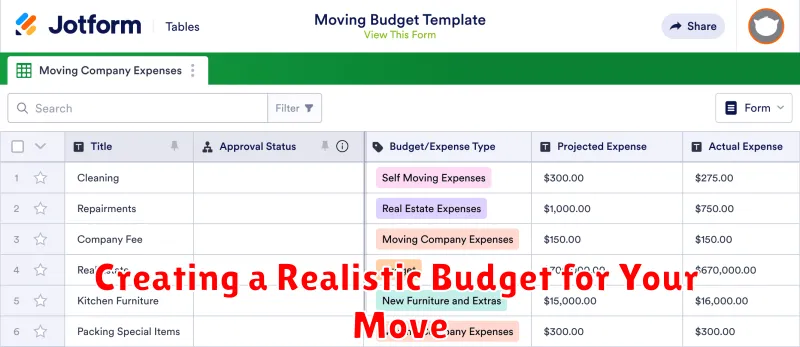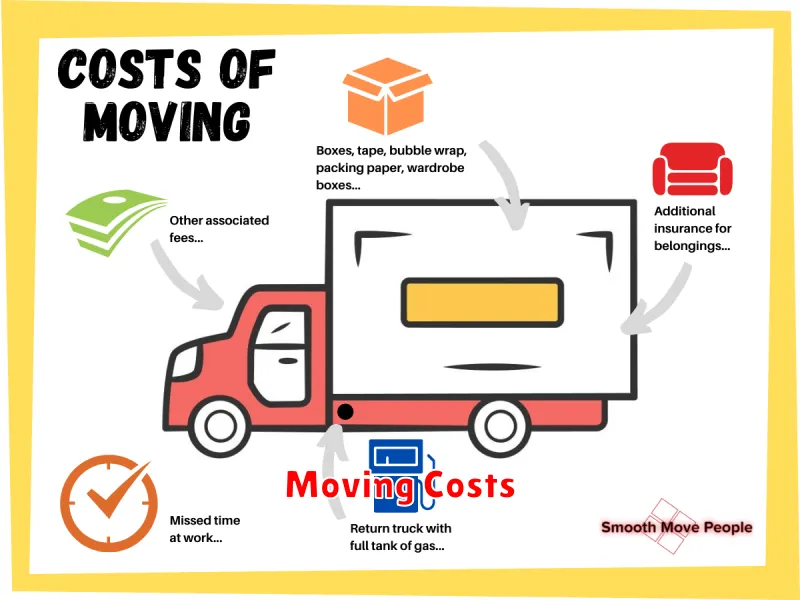Are you considering a move to a new city? It’s an exciting prospect, filled with opportunities and adventures. But before you pack your bags and head for greener pastures, it’s crucial to understand the financial impact of your decision. Moving can be a costly endeavor, impacting your budget in ways you might not anticipate. From housing costs to transportation expenses and even everyday living, every aspect of your finances will be affected by this significant life change.
This article delves into the key financial considerations when moving to a new city. We’ll explore the cost of living differences, potential income changes, and essential financial planning strategies to help you navigate this transition smoothly. By understanding the financial implications of your move, you can make informed decisions and ensure a seamless and financially secure relocation.
Researching the Cost of Living in Your Target City
Before making the big move, you need to figure out if you can afford it. Researching the cost of living in your target city is crucial. It’s not just about rent or mortgage payments; it’s about all the everyday expenses that add up.
There are plenty of online tools and resources available to help you compare costs. Websites like Numbeo and Expatistan allow you to see how prices for things like groceries, transportation, utilities, and entertainment vary between cities. These websites also provide a cost of living index that compares the overall cost of living in your current city with the target city.
Don’t forget to factor in the cost of moving itself. This includes transportation, packing materials, and potentially hiring movers. If you plan on buying a home, don’t forget the closing costs and potential property taxes.
Housing Costs: Rent or Mortgage Payments in the New Location
One of the most significant financial impacts of moving to a new city is the cost of housing. Whether you’re planning to rent or buy, it’s crucial to research and understand the housing market in your new location.
Rent: Rental prices can vary greatly depending on the neighborhood, size of the apartment, and amenities. Make sure to factor in utilities, such as water, electricity, and gas, as these can add up quickly. Consider using online resources like Zillow, Trulia, or Apartments.com to get an idea of average rent costs in the area.
Mortgage: If you plan to purchase a home, research mortgage rates, property taxes, and homeowners’ insurance costs. Be sure to work with a qualified realtor and mortgage lender to get pre-approved for a loan and understand the financial implications of homeownership. Remember, there are additional costs associated with homeownership, including maintenance, repairs, and landscaping.
Comparison: Before making a decision, compare the costs of renting versus buying. Consider your financial situation, long-term goals, and lifestyle preferences. If you plan to stay in the city for a long time, buying a home may be a more financially advantageous option. However, if you anticipate relocating in the near future, renting might be a more flexible and cost-effective choice.
Transportation Expenses: Commuting and Public Transport
When moving to a new city, one of the major financial considerations is the cost of transportation. This encompasses commuting to work or school and using public transport for daily errands. This expense can vary drastically depending on the city’s size, public transport system, and your chosen mode of transportation.
If you’re planning to drive, factor in the cost of car ownership, including gas, insurance, maintenance, and parking. Cities with heavy traffic congestion can significantly increase your fuel consumption and time spent commuting. Some cities offer parking permits or monthly passes, while others require you to pay for parking on a daily or hourly basis.
On the other hand, public transport, like buses, trains, or subways, can offer a more cost-effective solution. Many cities offer monthly passes or discounted fares for frequent commuters. However, the reliability and frequency of public transport systems vary, and you need to factor in travel time and potential delays.
Consider exploring alternative transportation options like cycling or walking, which can be both cost-efficient and beneficial for your health. However, ensure these options are safe and feasible, considering factors like distance, weather, and traffic conditions.
Before moving, research the transportation landscape of your new city. Check for average commute times, public transport options, and their associated costs. This will help you make informed decisions about your transportation needs and budget accordingly.
Food and Grocery Prices: Comparing Costs to Your Current City
One of the biggest financial impacts of moving to a new city is the cost of living. Food and groceries are a significant part of your monthly expenses, and it’s crucial to understand how these costs compare to your current city. Researching grocery prices can help you budget effectively and avoid surprises.
A good starting point is to use online tools or websites that compare the cost of living in different cities. These resources often include information on average grocery expenses, allowing you to gauge how much you might spend in your new location. Consider using price comparison websites for specific items you regularly purchase to get a more accurate estimate.
Additionally, explore local grocery stores and supermarkets in your potential new city. Compare their prices and identify stores that offer discounts, loyalty programs, or promotions. If you’re planning to cook frequently, consider the availability and cost of fresh produce, meat, and other ingredients you need.
Remember that food and grocery prices can vary depending on the neighborhood, seasonality, and even specific brands. Factor in these variations while you’re comparing costs. Don’t forget to consider the possibility of dining out or relying on meal delivery services, as those expenses will also impact your overall food budget.
Healthcare Expenses: Understanding Insurance and Provider Networks
Moving to a new city can significantly impact your healthcare expenses. Understanding your insurance coverage and provider networks is crucial to ensure a smooth transition and minimize financial burdens.
Your health insurance plan may have different coverage in your new city. It’s important to check if your current plan is in-network in the new location or if you need to switch to a new plan. Out-of-network providers often come with higher costs, so research your options thoroughly.
Provider networks are groups of doctors, hospitals, and other healthcare providers that your insurance plan contracts with. When you choose a provider within your network, your insurance plan covers a larger portion of the cost. If you opt for an out-of-network provider, you’ll likely pay a higher out-of-pocket expense.
Before moving, contact your insurance company to understand the following:
- In-network providers: Get a list of doctors, hospitals, and specialists within your network in your new city.
- Coverage: Find out what services are covered by your plan in your new location. This includes copayments, deductibles, and coinsurance.
- Out-of-network coverage: If you must see an out-of-network provider, understand the costs and reimbursement policies.
By thoroughly evaluating your healthcare coverage and provider networks, you can make informed decisions that protect your financial well-being after moving to a new city.
Taxes: Income, Property, and Sales Tax Differences
Moving to a new city can significantly impact your finances, and understanding the tax implications is crucial. Taxes are a major expense, and different cities have varying tax structures. Let’s explore the key tax differences to consider: income tax, property tax, and sales tax.
Income tax rates vary greatly from state to state and even within different cities. Some states have no income tax, while others have progressive rates. Research the income tax rates for your potential city and compare them to your current location. You might find your income tax liability changes, which can impact your take-home pay.
Property taxes are levied on real estate, and the rates can fluctuate significantly between cities. When considering a move, factor in the property tax rate for potential homes. Higher property tax rates can substantially increase your annual expenses, especially if you’re purchasing a home.
Sales tax is a tax on goods and services, and it varies depending on the city and state. Some cities have no sales tax, while others have a significant sales tax rate. Calculate how sales tax will affect your everyday purchases and the overall cost of living in your new city.
While it’s difficult to determine the exact financial impact of moving without researching the specific city, comparing income tax rates, property tax rates, and sales tax rates can help you understand the financial implications of your decision.
Job Market and Earning Potential in the New City
The job market and earning potential in your new city are crucial factors to consider when evaluating the financial impact of a move. Before you make the leap, thorough research is essential.
Start by exploring the industries that are thriving in your target city. Consider your skills and experience and see if they align with the needs of the local job market. Are there specific companies or sectors that are hiring?
Research the average salaries for your profession in the new city. Websites like Glassdoor, Indeed, and Salary.com can provide valuable insights. Compare this data to your current earnings to get an idea of your potential earning power in the new location.
Remember that cost of living varies greatly from city to city. A higher salary might not necessarily translate into a higher standard of living if the cost of housing, transportation, and other essentials are significantly higher in your new city.
It’s wise to factor in potential job search costs, such as relocation expenses, temporary housing, and professional networking. These expenses can add up, so it’s best to budget accordingly.
Moving Expenses: Packing, Transportation, and Storage
Moving to a new city can be an exciting adventure, but it also comes with a significant financial impact. One of the biggest expenses associated with moving is the cost of packing, transportation, and storage. These expenses can vary greatly depending on factors such as the distance of the move, the size of your household, and the services you choose.
Packing can be done yourself or hired out to professional movers. If you choose to pack yourself, you’ll need to purchase boxes, tape, packing materials, and possibly rent a truck. Professional movers can provide packing services, which include packing and unpacking your belongings, but this option can be more expensive.
Transportation is another major expense. You can transport your belongings yourself by renting a truck or trailer, or you can hire a moving company to handle the transportation. The cost of transportation will depend on the distance of the move and the weight of your belongings. If you’re moving long-distance, you may need to consider hiring a moving company to ensure your belongings are handled properly and arrive safely at your new home.
Storage is an optional expense that may be necessary if you are moving into a smaller home or if your new home is not ready for you to move in immediately. Storage units come in various sizes and pricing, so it’s important to choose the right size and compare prices from different storage facilities.
It’s important to budget for these moving expenses as part of your overall moving budget. Consider all the factors involved, including the size of your move, the distance you are moving, and the services you need. By carefully planning and researching your options, you can minimize your moving expenses and make your move as smooth and affordable as possible.
Hidden Costs: Utilities, Internet, and Entertainment
Moving to a new city can be an exciting adventure, but it’s essential to consider the hidden costs that can quickly add up. While you might have budgeted for rent and groceries, you might not have factored in the expense of utilities, internet, and entertainment. These costs can vary significantly depending on the city you are moving to and your lifestyle choices.
Utilities like electricity, water, gas, and trash removal can vary depending on the size of your apartment, the climate, and the energy efficiency of your building. Researching average utility costs for your new city can help you budget accordingly. Don’t forget to factor in the cost of setting up new accounts with utility providers, which may include connection fees or deposits.
Internet access is crucial for staying connected and working remotely. While some cities offer affordable broadband options, others have limited choices or higher prices. Research the available internet service providers in your area and compare their plans to find the best value for your needs. Consider your data usage and download speeds to make an informed decision.
Entertainment is a significant part of life in any city. Whether you enjoy going to concerts, museums, or sporting events, these activities can quickly add up. Factor in the cost of tickets, transportation, and potentially parking fees. Consider exploring free or low-cost entertainment options like parks, libraries, and community events.
By carefully budgeting for these hidden costs, you can ensure a smoother transition to your new city and avoid financial surprises. Remember to research the average costs for your chosen city and factor in your individual needs and lifestyle preferences.
Creating a Realistic Budget for Your Move

Moving to a new city is an exciting adventure, but it also comes with a significant financial impact. One of the most crucial steps in preparing for your move is creating a realistic budget that accounts for all the potential expenses. This will help you avoid unexpected financial stress and ensure a smooth transition to your new home.
Start by creating a detailed list of all the costs associated with your move, including:
- Moving Costs: Hiring movers, renting a moving truck, packing supplies, and fuel expenses.
- Transportation Costs: Flights, train tickets, or driving expenses to your new city.
- Housing Costs: Security deposit, first and last month’s rent, utilities, and potential moving-in fees.
- Initial Setup Costs: Furniture, appliances, kitchenware, and basic necessities for your new home.
- Living Expenses: Food, transportation, entertainment, and personal care items.
- Unexpected Expenses: This could include potential damage to your belongings during the move, unexpected repairs, or unforeseen circumstances. It’s wise to allocate a buffer for these contingencies.
Once you have a comprehensive list of expenses, research average costs in your new city and factor in any potential fluctuations. Remember to consider the time of year you’re moving, as costs can vary depending on seasonality.
It’s essential to be honest with yourself about your spending habits and prioritize your needs. Avoid unnecessary expenses and focus on building a sustainable budget that reflects your new lifestyle. If you’re uncertain about your financial situation, consider consulting with a financial advisor to get personalized guidance and ensure a smooth and financially sound transition to your new city.
Financial Planning for a Smooth Transition to a New City

Moving to a new city can be an exciting adventure, but it also comes with a significant financial impact. To ensure a smooth transition, proper financial planning is crucial. Start by assessing your current financial situation, including your income, expenses, and savings. Determine how much you can afford to spend on the move and create a realistic budget that accounts for all the costs involved.
Next, research the cost of living in your new city. Consider factors such as housing, transportation, food, utilities, and entertainment. Comparing the cost of living in your current city with the new city can help you adjust your budget accordingly.
A key aspect of financial planning is saving for the move. Set aside enough funds to cover the initial expenses, such as moving costs, security deposits, and first month’s rent or mortgage payments. If you are selling your current home, factor in any closing costs and potential relocation expenses.
Finally, it’s essential to consider the long-term financial implications of moving. If you are changing careers, factor in the cost of training or education. Explore potential investment opportunities and consider opening a new bank account and setting up a new credit line in your new city.
With careful financial planning, you can make the transition to a new city a successful and enjoyable experience.

